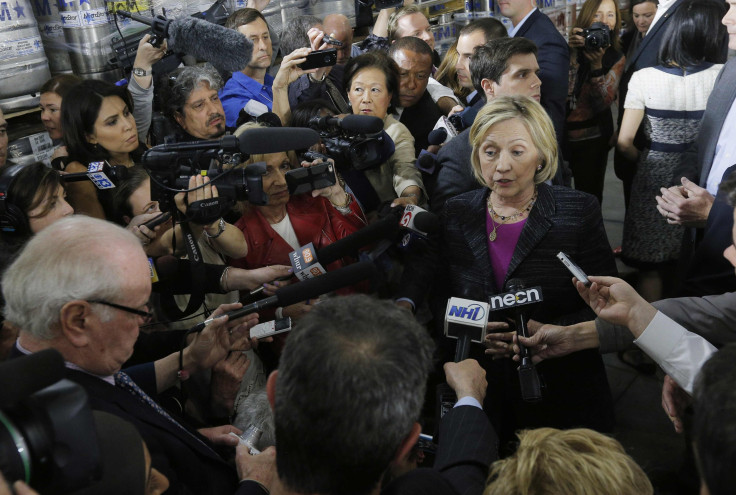Hillary Clinton Emails: Classified Information On Benghazi In Document Release

WASHINGTON -- Hundreds of pages of emails that were sent and received by Hillary Clinton while she was secretary of state illustrate her close ties to advisor Sidney Blumenthal in the months before and after the attack on the consulate in Benghazi. The emails -- only a fraction of the correspondences sent on her private email server but according to State all those dealing with the 2012 attack -- are drawing criticism from Republicans after the FBI blocked the release of one message.
The emails provided no immediate smoking gun or further fuel for Republican attacks. But it is unlikely the release will quiet criticism from Republicans. Given time to compare the emails to timelines, other public statements and relevant context, Republicans may find other grounds for criticism. And it's likely the GOP will call for Clinton to make the entire server available for inspection.
The most noteworthy item in the emails was a portion that was missing. A piece of an email regarding reports of arrests of those believed to be responsible for the deaths of Ambassador Chris Stevens and three others in Benghazi was redacted by request of the FBI. The information wasn’t classified at the time of its sending but was deemed so in anticipation of Friday’s release.
Republicans focused on the fact that information now deemed sensitive had been on her server. “The impact is still not fully known, but it’s troubling that highly sensitive information, now deemed classified, was put at risk on her off-the-books server,” Republican Chairman Reince Priebus said. “Every new revelation is a constant reminder that Hillary Clinton can’t be trusted. Until she hands over the secret server to an independent investigator, the American people will never get the truth.”
Clinton told reporters in New Hampshire that she was aware of the request from the FBI to classify that portion, “but that doesn't change the fact all of the information in the emails was handled appropriately," according to The Associated Press.
Rep. Trey Gowdy, the top Republican on the House Benghazi Committee, suggested the released emails -- reviewed by Clinton’s lawyers before they were released -- left unanswered questions. “It is important to remember these email messages are just one piece of information that cannot be completely evaluated or fully understood without the total record,” Gowdy said in a statement. “The Committee is working to collect and evaluate all of the relevant and material information necessary to evaluate the full range of issues in context.”
Democrats argue the emails absolve Clinton of accusations that she ordered American forces not to try to rescue Stevens and the other Americans killed in the attacks. “Instead of the selective leaking that has happened so far, the American people can now read all of these emails and see for themselves that they contain no evidence to back up claims that Secretary Clinton ordered a stand-down,” Rep. Elijah Cummings, the top Democrat on the House Benghazi Committee said in a statement.
Clinton has agreed to testify before the House Benghazi Committee, initially saying she would be willing to do so before the end of May. But Gowdy has insisted that all documents in the possession of the State Department be turned over first. State officials have said it could take until January to finish reviewing and make them available. Whether the release on Friday could speed Clinton’s testimony remains unclear.
The emails did offer some insights into Clinton’s routines and how she interacted with her staff. Emails show that she frequently asked her staff to print documents. Her staff kept a detailed schedule for her, indicating to her and top aides whether her husband Bill Clinton was spending the night in Washington, D.C., or at their home in New York.
More than a year before the attacks, Clinton was receiving regular correspondence from advisors outside the State Department about the situation in Libya. Blumenthal would send her long memos, detailing the political situation in the country and elsewhere in the region or quoting his contacts who dealt with the government. Clinton often forwarded those emails to her staff, requesting each time that they be printed.
Blumenthal wasn’t the only one weighing in on the situation. On March 30, 2011, Anne-Marie Slaughter, formerly a State Department employee, wrote Clinton to compliment her on her picture in the New York Times and to offer her thoughts on the situation in Libya. “For what it's worth, I am VERY dubious about arming the Libyan rebels. Our best bet is to keep pressure on BOTH sides to force a diplo solution.”
The emails also provided few new details on some of the most controversial elements surrounding the Benghazi attacks, including the initial blaming of an anti-Muslim video and the talking points that were created to detail to the State Department’s response.
Two weeks after the Sept. 27 attacks, Clinton was still receiving updates about the status of the video that had raised so much controversy. Denis McDonough, now the White House Chief of Staff who at the time was the Deputy National Security Advisor, sent Clinton and other top State Department officials the office and mobile phone numbers of Google CEO Larry Page and YouTube CEO Salar Kamangar.
Top aide Jacob Sullivan emailed Clinton after U.N. Ambassador Susan Rice appeared on all five Sunday-morning news shows to discuss the attacks. He sent her transcripts from all the appearances, and provided commentary on her ABC “This Week” interview. “She wasn't asked about whether we had any Intel,” Sullivan wrote to Clinton. “But she did make clear our view that this started spontaneously and then evolved. The only troubling sentence relates to the investigation, specifically: ‘And we'll see when the investigation unfolds whether what was — what transpired in Benghazi might have unfolded differently in different circumstances.’ But she got pushed there.”
© Copyright IBTimes 2024. All rights reserved.






















